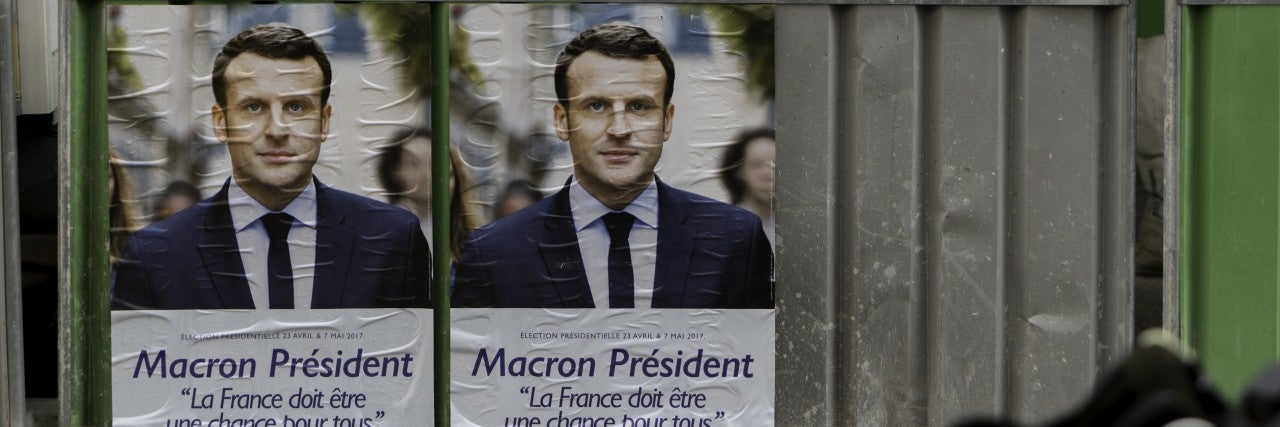April 20, 2017
The 2017 presidential election is likely to be the most unpredictable in France since the beginning of the Fifth Republic.
Who could have imagined even just a year ago that outgoing President François Hollande would decide not to run, the first president not to seek a second term?
Who could have imagined that Nicolas Sarkozy, the former president and champion of the right, would be eliminated in the first round of the Republican primary?
Who could have imagined that the two outsiders, François Fillon, the Republican Party candidate, and Benoît Hamon, the Socialist, would become candidates?
Who would have believed that Emmanuel Macron, unknown to the French people three years ago, and whose “En Marche!” (“Forward!”) Party was only formed last year, would be poised for victory?
And who would have believed that Jean-Luc Mélenchon, the leftist outsider and veteran of three decades of politics, would come to personify renewal for ever-increasing numbers of French people?
Mere days from the polls, the French, mostly disillusioned with their politicians, are preparing to gamble with democracy as though it were a casino or a game of Russian roulette. But nothing is more dangerous than high-stakes gambling with democracy; extremists rarely return the keys to power once the people have handed them over.
Most French people manifestly want to punish the traditional political parties. This is the reason for an irrational response from an electorate disappointed by recent governments and intent on a new political deal, whatever the cost. The succession of broken promises, scandals, the permanent terrorist threat, combined with profound cultural insecurity in the face of the growth of parallel societies and rampant Islamism, the increasingly shared feeling that Europe is proceeding without its people and at their expense, all contribute to weakening what the leaders of the traditional political parties have to say when faced with voters ever keener to mix things up.
The establishments of left and right alike, incapable of addressing the public’s questions, often overly evasive or relativistic about social threats and deaf to their compatriots’ fears about France’s future in Europe and the globalized world, are on the brink of an historic defeat.
As recently as 2012, François Hollande and Nicolas Sarkozy between them garnered 55% of the vote, In striking contrast, the current combined ratings (albeit only based on opinion polls) of the two main party candidates, Benoit Hamon and François Fillon, add up to around 25%, an unheard-of 30 points lower!
In the face of this massive disaffection, we are naturally experiencing a radicalization of the political spectrum. Dialogue between political figures has become difficult, and compromise almost impossible. Social media makes things worse by reinforcing existing views through algorithms, ghettoizing opinions, exchanging insults instead of views. The “clash” has replaced political debate, and “fake news” putrefies the Web.
Under these circumstances, we simply cannot rule out the possibility, after Sunday, of a second round between the extreme left and the extreme right; between Jean-Luc Mélenchon and Marine Le Pen. That would constitute a seismic shock and signal a serious democratic crisis in which moderate voices have been drowned out. Such a scenario would have serious consequences for France’s democracy and also for policy.
If one of these two self-proclaimed “separatist” candidates wins the presidential election, France could potentially find itself leaving the European Union, destroying the dream of a Europe of peace, cooperation, and solidarity that had been implemented after the sufferings of two world wars.
President Mélenchon or President Le Pen might adopt diplomatic policies vastly different from those of their predecessors. France might reexamine its alliances. It could align itself with Vladimir Putin’s Russia, allowing the Baltic borders to be redrawn and backing the regime of Bashar al-Assad. Transatlantic relations could shift as well, since both extreme leaders want France to leave NATO. The leftist, in fact, is particularly given to issuing hostile statements to Washington, and has even expressed the wish to join the Bolivarian Alliance with Cuba and Venezuela.
Mélenchon and Le Pen continue to generate real concern about antisemitism as well.Marine Le Pen has clearly tried to detoxify her image, notably in breaking with her father, but her recent statements suggesting that the World War II Vel' d'Hiv roundup of Jews was not the fault of France, and her often poisonous entourage, from Axel Loustau to Frédéric Chatillon (who reportedly are supporters of Nazi ideology), remain deeply disturbing.
As for Jean-Luc Mélenchon, his statements have not been reassuring. Following the demonstrations during the Gaza war in 2014, for example, when mobs chanted antisemitic slogans, attacked synagogues, and waved ISIS flags, he said: “the demonstrations had been dignified, respecting the values of the Republic.” And again in late August, when, after those horrendous demonstrations, the Jewish community gathered in front of the Israeli embassy, he said: “If we have anything to denounce, it is those of our [Jewish] compatriots who thought they should demonstrate in front of the embassy of a foreign country or to go and serve in its army.”
France is at a crossroads. Will it remain true to its history, its values, its national motto of liberty, equality and fraternity; will it remain a strong pillar of the European Union, of NATO, and of the transatlantic alliance, or will it go down a new path with consequences we cannot predict? Many will be watching, wondering, and hoping.
Simone Rodan-Benzaquen is Director of AJC Europe.
Photo By: Lorie Shaull



